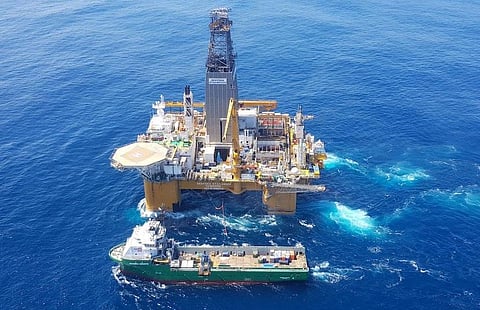The Brulpadda find, estimated at about 1bn barrels by Total Chief Executive Officer Patrick Pouyanne, could be enough to supply South Africa's refineries for almost four years. That's a boon for a country that has always been short of oil and is running out of its scant domestic supply of gas.
"It is really transformational,'' Andrew Latham, vice president of global exploration at consultant Wood MacKenzie Ltd., said Thursday. "This could be a discovery that kickstarts a bit of a gas strategy for South Africa.''
The field of primarily gas-condensate – a light liquid hydrocarbon – was discovered about 175 kilometres (109 miles) off the country's southern coast in the Outeniqua Basin. The area, where Exxon Mobil Corp. and Eni SpA also hold stakes, may now draw further interest, especially since South Africa is due to introduce new legislation later this year aimed at spurring exploration.
The find "is potentially a major boost for the economy," Minerals Minister Gwede Mantashe said. "We welcome it as we continue to seek investment."
'Catalytic find'
President Cyril Ramaphosa is seeking to lure $100bn of investments by 2023 to revive a struggling economy. The country's energy supply is largely based on coal, while state power utility Eskom Holdings SOC Ltd. also runs turbines on costly diesel fuel. A failed exploration campaign in shallow waters has meant a gas-to-liquids refinery at Mossel Bay runs well below capacity.
Total's discovery is a "catalytic find" for the country, said Niall Kramer, chief executive officer of the South African Oil & Gas Alliance, an industry lobby group. "There's nothing that has been on this kind of scale."
The resource could be about three times the size of all South Africa's gas finds to date, according to WoodMac's Latham. Total, the operator of the license, now plans to acquire 3D seismic data before drilling as many as four more exploration wells there. But it cautions that the operating environment offshore is tough.
"The region is quite difficult to operate," Pouyanne said on a conference call. "Huge waves, the weather isn't very easy."
Africa as a whole has seen an increase in drilling, with oil and gas rigs around the continent topping 100 in recent months, according to Baker Hughes data. The count was as low as 77 in 2017.
Total has a 45% working interest in Block 11b/12B, Qatar Petroleum holds 25%, CNR International 20 percent and Main Street, a South African consortium, 10%.

